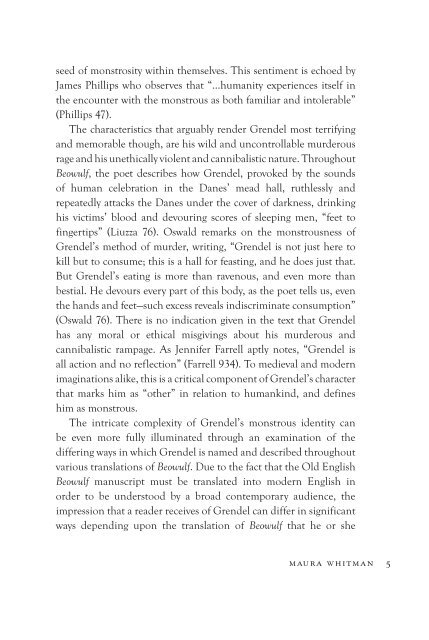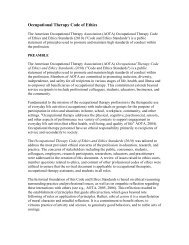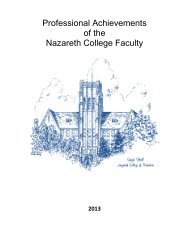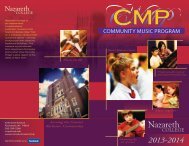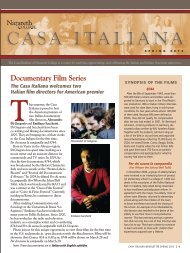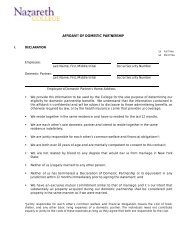seed <strong>of</strong> monstrosity within themselves. This sentiment is echoed byJames Phillips who observes that “…humanity experiences itself inthe encounter with the monstrous as both familiar and intolerable”(Phillips 47).The characteristics that arguably render Grendel most terrifyingand memorable though, are his wild and uncontrollable murderousrage and his unethically violent and cannibalistic nature. ThroughoutBeowulf, the poet describes how Grendel, provoked by the sounds<strong>of</strong> human celebration in the Danes’ mead hall, ruthlessly andrepeatedly attacks the Danes under the cover <strong>of</strong> darkness, drinkinghis victims’ blood and devouring scores <strong>of</strong> sleeping men, “feet t<strong>of</strong>ingertips” (Liuzza 76). Oswald remarks on the monstrousness <strong>of</strong>Grendel’s method <strong>of</strong> murder, writing, “Grendel is not just here tokill but to consume; this is a hall for feasting, and he does just that.But Grendel’s eating is more than ravenous, and even more thanbestial. He devours every part <strong>of</strong> this body, as the poet tells us, eventhe hands and feet—such excess reveals indiscriminate consumption”(Oswald 76). There is no indication given in the text that Grendelhas any moral or ethical misgivings about his murderous andcannibalistic rampage. As Jennifer Farrell aptly notes, “Grendel isall action and no reflection” (Farrell 934). To medieval and modernimaginations alike, this is a critical component <strong>of</strong> Grendel’s characterthat marks him as “other” in relation to humankind, and defineshim as monstrous.The intricate complexity <strong>of</strong> Grendel’s monstrous identity canbe even more fully illuminated through an examination <strong>of</strong> thediffering ways in which Grendel is named and described throughoutvarious translations <strong>of</strong> Beowulf. Due to the fact that the Old EnglishBeowulf manuscript must be translated into modern English inorder to be understood by a broad contemporary audience, theimpression that a reader receives <strong>of</strong> Grendel can differ in significantways depending upon the translation <strong>of</strong> Beowulf that he or shemaura whitman 5
is exposed to. Therefore, in order to come to a more nuancedunderstanding <strong>of</strong> Grendel’s nature and identity, I have comparedthe varying ways in which Grendel is named and described throughan examination <strong>of</strong> three different Beowulf translations: E. TalbotDonaldson’s, published in 1966, and R.M. Liuzza’s, published in2000, and Seamus Heaney’s, published in 2000. By providing aunique pallet <strong>of</strong> names with which Grendel is painted throughoutthe text, each translator succeeds in emphasizing a different aspect<strong>of</strong> Grendel’s human and/or monstrous qualities. For instance, <strong>of</strong>the three translations, E. Talbot Donaldson’s is by far the mostcharitable and empathetic toward Grendel, emphasizing thedarkness, exile, and isolation associated with Grendel’s experienceliving on the outskirts <strong>of</strong> society. Donaldson identifies Grendel bysuch melancholy and humanizing descriptions as: “he who dwelt indarkness,” “unhappy creature,” “the creature deprived <strong>of</strong> joy,” “therover <strong>of</strong> borders,” and “the terrible walker-alone” (Donaldson 3, 3,13, 3, 4). These descriptions can be compared to those found inR.M. Liuzza’s translation which, while continuing to acknowledgesome <strong>of</strong> Grendel’s more human qualities in referring to him as a“miserable man,” also succeeds in more clearly emphasizing Grendel’simmense strength, power, and formidability through such namesas: “mighty stalker <strong>of</strong> the marshes,” “the great ravager,” “greatest <strong>of</strong>night-evils,” “warrior…bereft <strong>of</strong> joys,” and “notorious one” (Liuzza56, 56, 58, 59, 75). Seamus Heaney’s translation, by even starkercontrast, focuses almost exclusively on those aspects <strong>of</strong> Grendel’scharacter that render him irreconcilably “other,” emphasizing hisbrutality and monstrosity with such descriptions as: “a fiend out<strong>of</strong> hell,” “malignant by nature,” “merciless Grendel,” “dark deathshadow,”“shadow-stalker,” “terror-monger,” “alien spirit,” “theLord’s outcast,” and “enemy <strong>of</strong> mankind” (Heaney 9, 11, 11, 13, 47,51, 55, 13, 89). While I would argue that no single translation <strong>of</strong>Beowulf can convey a complete and ultimate depiction <strong>of</strong> Grendel’s6 afternoons <strong>of</strong> alterity
- Page 1 and 2: Afternoons of Alterity A Codex of t
- Page 4 and 5: Table of ContentsFrom Medieval Mars
- Page 6 and 7: From Medieval Marsh Monsters toFutu
- Page 8 and 9: imagination, we must first attempt
- Page 12 and 13: essence as a monster, it seems reas
- Page 14 and 15: she bore two sons, one from the imp
- Page 16 and 17: perhaps, anti-heroes) of the futuri
- Page 18 and 19: to watch the murder and mutilation
- Page 20 and 21: and modern audiences through their
- Page 22 and 23: Works Cited“Bushwhacked.” Firef
- Page 24 and 25: Projecting Otherness ontothe Disabl
- Page 26 and 27: in any systematic structuration. An
- Page 28 and 29: The idea of the monstrous’ vulner
- Page 30 and 31: not us and are in the proximity of
- Page 32: they want to be treated. The interv
- Page 36: Monstrosity and theIrruption of Rea
- Page 39 and 40: describing his fears of this place
- Page 41 and 42: stained with sin” (Spearing 221).
- Page 43: often and at will to show man somet
- Page 46 and 47: What’s Love Got To Do With It?The
- Page 48 and 49: story than as the beginning? What f
- Page 50 and 51: It is textual content like this tha
- Page 52 and 53: through the story as the Green Knig
- Page 54 and 55: the first advocating voices for end
- Page 56 and 57: “capable of seeing things objecti
- Page 58 and 59: Darkness: The True Monster ofLitera
- Page 60 and 61:
the way they can make us feel, but
- Page 62 and 63:
not only closes out, extinguishes,
- Page 64 and 65:
and temptation, most especially for
- Page 66 and 67:
hours “led to the term ‘night
- Page 68 and 69:
specifically his relationship to da
- Page 70 and 71:
humanization of Grendel draws the r
- Page 72 and 73:
subconscious the message may be. Th
- Page 74 and 75:
Serial MonstrosityEmily Mastrobatti
- Page 76 and 77:
is clear that they are monsters and
- Page 78 and 79:
murderer that he once was. He has b
- Page 80 and 81:
of the killing, “When investigato
- Page 82 and 83:
ook “contains recipes from the bo
- Page 84 and 85:
asks Charles Manson to marry her, t
- Page 86 and 87:
Monstrous Mothers andObjectified Da
- Page 88 and 89:
and her sisters plot to kill their
- Page 90 and 91:
easons for “otherness.” On top
- Page 92 and 93:
The original ideas are still intact
- Page 94 and 95:
objectified creature. “Cultures o
- Page 96 and 97:
Works CitedAcker, P. Horror and the
- Page 98 and 99:
Grendel: A Manifestation ofMedieval
- Page 100 and 101:
ut never was his physicality hinted
- Page 102 and 103:
to wander in the darkness and the c
- Page 104 and 105:
Magic could not resurrect Grendel t
- Page 106 and 107:
Works CitedBeowulf. Trans. RM Liuzz
- Page 108 and 109:
The Monster Under the BedThe Creati
- Page 110 and 111:
to procreate but the accepted manif
- Page 112 and 113:
Cain had/killed his father’s son
- Page 114 and 115:
can, without a doubt, be placed int
- Page 116 and 117:
The vagina’s ability to function
- Page 118:
Ed. Barbara K. Gold, et all. Albany
- Page 121 and 122:
To understand precisely how states
- Page 123 and 124:
a strict delineation between each g
- Page 125 and 126:
monstrous and societal rules to fol
- Page 127 and 128:
Gawain is willing to accept his mis
- Page 129 and 130:
survive, challenge, and defeat. Esp
- Page 131 and 132:
governmental standards, then are we
- Page 134 and 135:
They Walk Among UsOccupational Viol
- Page 136 and 137:
sports and regard our members of th
- Page 138 and 139:
modern readers are not part of the
- Page 140 and 141:
otherness and disdain for humanity.
- Page 142 and 143:
are underpaid and for the most part
- Page 144 and 145:
Home and Spatial IdentityPhysical t
- Page 146 and 147:
closeness among the people that the
- Page 148 and 149:
Into the dark gorge I ventured; the
- Page 150 and 151:
the treasures that fill up their ho
- Page 152 and 153:
threatened by the very existence of
- Page 154 and 155:
and draped in damp, shaggy moss, an
- Page 156 and 157:
individual. Home resides within the
- Page 158:
Works CitedArmitage, Simon. Sir Gaw


